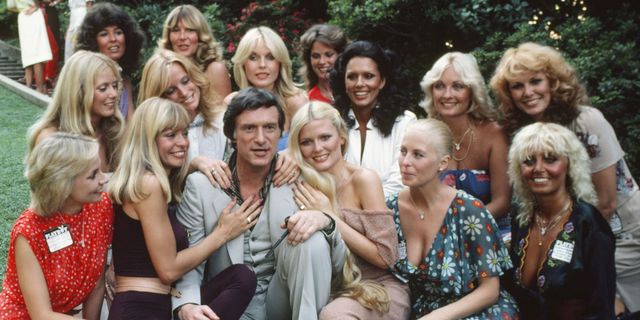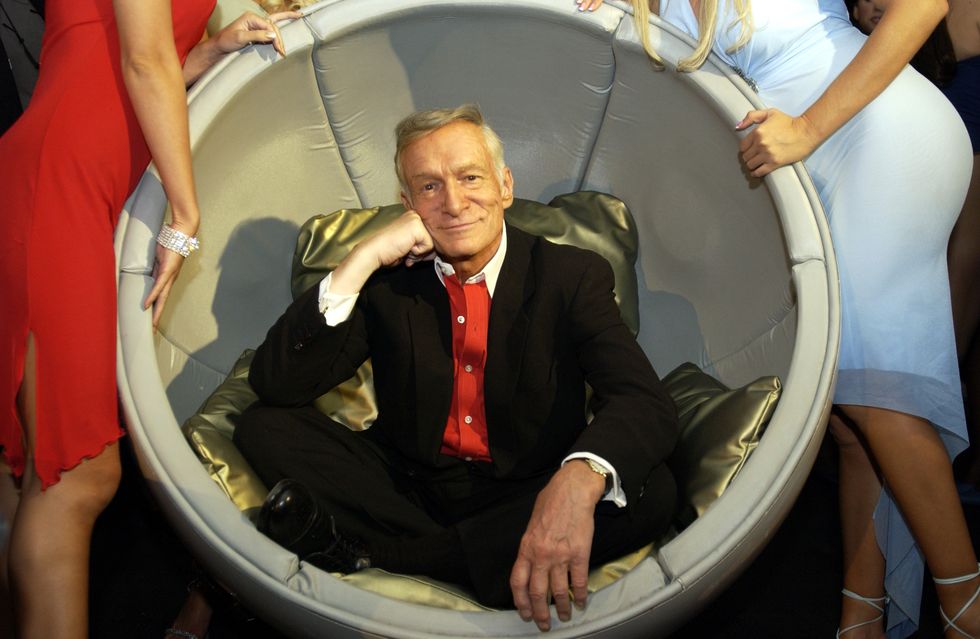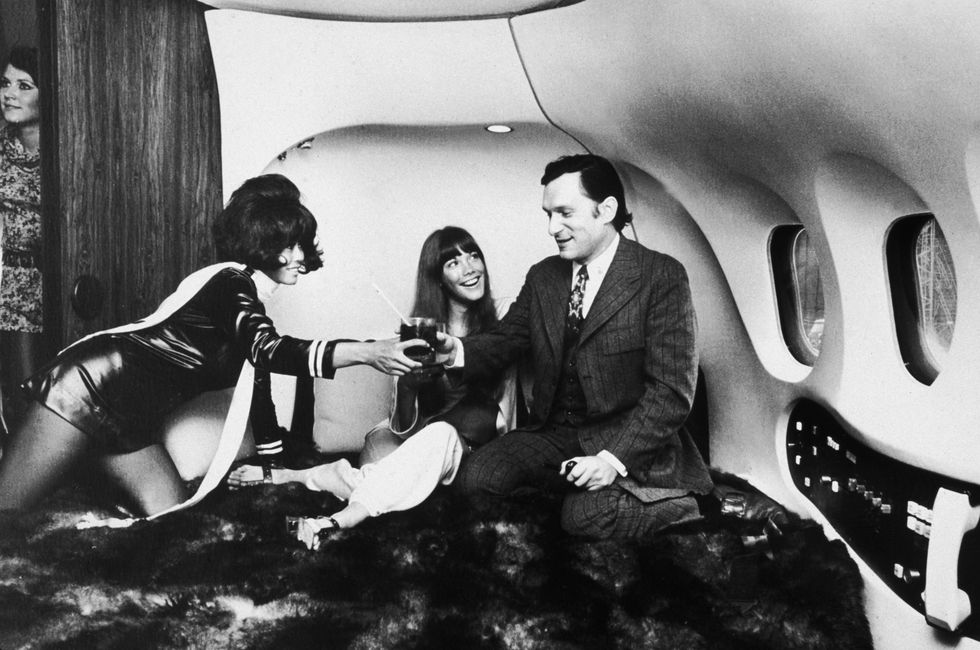Here's a tip: Every time you hear someone call Hugh Hefner the face of the 'sexual revolution', remember what he did to Marilyn Monroe.
Hef's remains will, famously, be interred in the vault next to Marilyn Monroe, whose nude photographs were featured in the first issue of Playboy. He purchased the vault for $75,000 in 1992, and forever after advertised this choice as much as humanly possible, giving multiple interviews in which he affirmed his everlasting boner for Monroe:
'I would have loved to [date her]. I'm a sucker for blondes and she is the ultimate blonde,' he told CBS Los Angeles in 2012. 'It has a completion notion to it. I will be spending the rest of my eternity with Marilyn.'
There's just one problem: Protestations of eternal love aside, Hugh Hefner never fucking spoke to Marilyn. He also had every reason to know that she despised him, and didn't welcome his attention. He certainly didn't ask for permission to publish those photos; they were taken to make ends meet before she had a film career, and she didn't want people seeing them. She was paid a mere $50 flat fee for the modeling session, and signed the release form with a fake name ('Mona Monroe') specifically because, should she ever be employed by a studio as an actress, she could be fired for posing in the nude:
'I was nervous, embarrassed, even ashamed of what I had done,' she said, 'and I did not want my name to appear on that model release'. Monroe had every reason to believe her career would be ruined by Playboy. For the rest of her life, she spoke bitterly about the fact that 'I never even received a thank-you from all those who made millions off a nude Marilyn photograph. I even had to buy a copy of the magazine to see myself in it.'
So, there you have it. After non-consensually exposing a woman's naked body, and endangering her for his own profit, Hugh Hefner responded to that woman's expressions of anger and hurt by paying $75,000 for a crypt plot so that he could demonstrate ownership over her corpse. And this is the guy that multiple media outlets are referring to as the face of the 'sexual revolution'.
The idea of Hefner as a benevolent rebel, rather than a scary creep, is one that Hefner himself did a lot to cultivate. 'I changed attitudes toward sex', he once told the New York Times when asked what he was proud of. 'That nice people can live together now. That I decontaminated the notion of premarital sex. That gives me great satisfaction.' The Playboy philosophy was supposedly the fun, libertine alternative to the prude family-values drudgery of the 1950s. Instead of getting married and grimly hoeing your row at the office, you could instead live a free-wheeling, swinging lifestyle, 'putting a little mood music on the phonograph and inviting in a female acquaintance for a quiet discussion on Picasso, Nietzsche, jazz, sex'.
Hefner's philosophy admittedly differed from the mainstream heterosexuality of the 1950s — but only in the sense that it was built to better privilege straight men. As Barbara Ehrenreich detailed in her book The Hearts of Men, before Playboy, bachelors were seen as losers who couldn't get wives of their own. (They were also suspected of being gay, as the implications around the phrase 'confirmed bachelor' still attest.) Hefner changed the public perception of single men, turning them into swinging (hetero) sex gods having adventures that poor henpecked married men could only dream of. This idea is still with us today — if you've ever seen an episode of Entourage or read a pick-up artist's blog, you've reaped the benefits of Hefner's work. But the change was never meant to make sex more fulfilling for women, or even queer men. Far from it.
Hefner drew inspiration from books like Philip Wylie's Generation of Vipers, which argued that America was dominated by tyrannical, castrating wives who held all the power in their relationships. Wylie, who went on to write for Playboy, inveighed against the typical American woman as a sexless, controlling, violent beast. 'She is about twenty-five pounds overweight, with no sprint, but sharp heels and a hard backhand which she does not regard as a foul but a womanly defence. In a thousand of her there is not sex appeal enough to budge a hermit ten paces off a rock ledge', and charged that 'momism' was producing a generation of emasculated, ineffectual men. Accordingly, early issues of Playboy portrayed American women as 'emasculating, money-hungry and obsessed with tricking a man into marriage'.Keep in mind: This thinking arose out of the 1940s and 1950s, a time when women had vanishingly little social or political power. Basically, if you've ever watched an episode of Mad Men and concluded that Betty Draper seemed a little too liberated, Playboy was the magazine for you.
In the pre-Playboy variety of sexism, women were children who had to be taken care of and disciplined by their husbands. In the new, 'radical' Playboy philosophy, women were sour, scolding mommies to be rebelled against or hot commodities to be acquired. This split between conservative misogyny and hip, 'liberal' misogyny is still with us, and still expressed in much the same terms. But Hefner never challenged the sexism at the heart of the social order — he just wanted to remove any responsibility men might bear to the women they slept with, and make sure men's experience of sex was consequence-free. His revolution re-arranged the surface, but left the underlying structure of patriarchy intact.
This might have seemed more radical, had Hefner's rise not also coincided with the rise of several actual revolutionary movements aimed at undoing America's sexual repression. It was hard to see cheesy topless pictures as 'revolutionary' when transgender women at the Stonewall Inn were throwing bricks at police officers. Similarly, though Hefner saw feminists as a threat to his empire, and specifically commissioned pieces for Playboy aimed at smearing the movement as full of crazy, anti-sex harridans. 'These chicks are our natural enemy', he wrote in one leaked memo; 'what I want is a devastating piece that takes the militant feminists apart. [They are] unalterably opposed to the romantic boy-girl society that Playboy promotes'. Second-wave feminists were, quite often, doing more genuinely subversive and useful work on sexual pleasure than he was. They didn't oppose sex — they just opposed letting men set all the terms for it. Even in the 1960s and 1970s, feminists were publishing articles on vaginal vs. clitoral orgasms, Betty Dodson was teaching masturbation workshops, and queer women were founding sex-positive sex toy shops like Eve's Garden and Good Vibrations, aimed at empowering women to take their own pleasure back and explore their kinks in safe, supportive, non-Playboy-like environments. In time, third-wave feminists explored the possibilities for ethical sex work, unionising strip clubs, and making porn that depicted enthusiastically consenting people of all genders, body types, and sexualities. That wave hit in the 1990s—right around the time Hugh Hefner was buying real estate next to Marilyn Monroe's corpse.
Hefner's defenders have argued that he paved the way for these movements, or, as journalist Sam Thielman did on Twitter, that 'there might be such a problem with the authoritarian enforcement of medieval purity standards to which Playboy objected that even Hefner's shitty, compromised libertinism was preferable'. But Hefner didn't do anything for those movements, except maybe make them necessary. It's flat-out insulting to suggest that GLBT people and women would not have been able to organize without him. Given the decades of press painting him as a rebel or a liberator, it may be jarring to see Hefner as his generation's version of a Men's Rights Activist (though, if Generation of Vipers didn't prefigure the 'manosphere', with its collection of toxic men raving against the all-powerful feminists running and ruining America, then nothing did). But just because Hefner worked hard to burnish his own image doesn't mean we have to believe the hype.
These points are less shocking than they used to be, largely because Hefner lost the fight. Feminism has been mainstreamed. Most versions of "sex-positivity" stress enthusiastic consent over manly coolness. People no longer believe that pornography or sex has to come packaged with dismissiveness or distrust of women — nor should they. As the years rolled by, more allegations of Hefner's creepy behavior came rolling in — everything from verbally berating and controlling the girls of Girls Next Door to a lawsuit alleging that Hefner let Bill Cosby rape female guests at the Playboy Mansion.
But, most damning of all, Hefner just seemed out of date, a relic of an older and worse era. When he died, news of his vault next to Monroe broke again. But instead of seeing it as cool, or daring, commentators overwhelmingly condemned the move as creepy. They were more concerned for Monroe than they were admiring of Hefner's choice to use her body as a prop.
If people had expressed that concern when Playboy was first published, we might not be talking about Hefner at all.
















